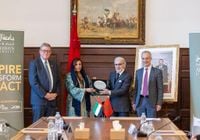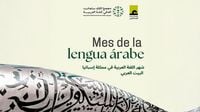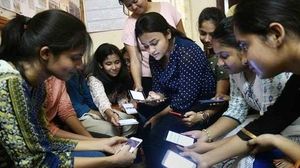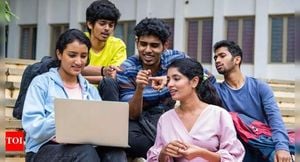On April 21, 2025, Casa Árabe in Madrid will kick off the Month of the Arabic Language, hosted by the King Salman Global Arabic Language Academy of Saudi Arabia (KSGAAL). This month-long celebration aims to promote the richness and diversity of the Arabic language through various activities, including competitions and educational training sessions.
The opening ceremony is set to begin at 09:00 in the auditorium located at c/ Alcalá, 62, Madrid. The event will feature speeches from notable figures such as Miguel Moro Aguilar, the Director General of Casa Árabe, Abdullah bin Saleh Al-Washmi, the Secretary General of KSGAAL, and Princess Haifa bint Abdulaziz Al-Mogrin, the Saudi Ambassador to Spain.
During the inauguration, prizes will be awarded for the calligraphy, storytelling, and poetry competitions that took place in March. Following the awards, a representative from KSGAAL will deliver a speech titled ‘The efforts of the Kingdom of Saudi Arabia in the field of teaching Arabic as a foreign language’.
At noon on the same day, a round table discussion will take place, focusing on ‘The teaching of Arabic as a foreign language: challenges and realities’. This panel will include experts from KSGAAL and Spanish universities, such as Pedro Buendía Pérez from the Complutense University of Madrid and Ignacio Gutiérrez de Terán from the Autonomous University of Madrid. The discussion will be moderated by Hatim Bouazza Touil from Rey Juan Carlos University.
The Month of the Arabic Language aims to foster collaboration between teachers and students, providing training sessions and establishing partnerships with universities and training centers. The events will be streamed live on Casa Árabe's YouTube channel, making them accessible to a wider audience.
From April 22 to April 25, Casa Árabe will host a training course for teachers of Arabic as a foreign language. This course will focus on enhancing participants' skills in preparing assessment tests. Additionally, on April 23, Arabic language students will receive training on online resources for learning Arabic, including the Hamza certification, which aims to become the international accreditation exam for Arabic proficiency.
The closing day of the Month of the Arabic Language will be on April 25, 2025, when diplomas will be awarded for the various courses conducted throughout the month. The Saudi delegation will also visit educational institutions in Madrid, Granada, and Córdoba to observe Arabic teaching methodologies and strengths.
In Madrid, the delegation plans to visit Rey Juan Carlos University on April 22, the Autonomous University of Madrid on April 23, and the Complutense University on April 24. Their itinerary includes training sessions for teachers and students at the University of Granada on April 29 and 30, followed by a visit to the School of Languages in Córdoba on April 30, where they will meet with the Arabic team.
Meanwhile, in a related development, Al Akhawayn University in Ifrane (AUI) and the American University of Sharjah (AUS) signed a Memorandum of Understanding (MoU) on April 16, 2025, to enhance cooperation in digital humanities, Arabic and Islamic studies, and ethical artificial intelligence.
The signing ceremony took place at the headquarters of Bank Al-Maghrib in Rabat, attended by key figures including Sheikha Bodour bint Sultan Al Qasimi, Chairperson of AUS’s Board of Trustees, Abdellatif Jouahri, Chancellor of AUI, Amine Bensaid, President of AUI, and Tod Laursen, Chancellor of AUS.
Amine Bensaid highlighted that the partnership reflects AUI’s vision of balancing cultural identity with technological advancements. He emphasized that the agreement aims to promote scientific research, rethink Arabic studies in the age of AI, and create tools that reinforce cultural identity while serving the youth.
Tod Laursen echoed these sentiments, stating that the partnership supports AUS’s vision of a “borderless higher education system built on intellectual cooperation.” He noted that the collaboration will expand opportunities for research and contribute ethically to AI development.
One of the major goals of the MoU is to establish a joint center for digital humanities and pedagogy, which will utilize AI to support research in Arabic and Muslim literature, cultural studies, and communication systems. The agreement also opens avenues for cooperation in various fields, including science, engineering, management, architecture, arts, design, and archival research.
Plans include the development of an open-source Arabic database containing literary works, media content, and academic publications that reflect the cultural and linguistic diversity of both Morocco and the UAE. The MoU outlines provisions for faculty and staff exchanges, student mobility programs, shared teaching resources, co-developed courses, and joint research projects.
Moreover, it supports the co-supervision of master’s and doctoral theses, joint conferences and workshops, and the establishment of a fund for academic initiatives. This partnership aligns with the global strategies of both universities, aiming to foster knowledge ecosystems, spur innovation, and address significant regional and international challenges through interdisciplinary research.
As both Casa Árabe and the universities embark on these initiatives, they underscore the importance of Arabic language and culture in a globalized world, promoting educational opportunities that bridge traditional knowledge with modern technological advancements.





